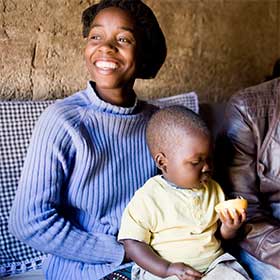Providing only breast milk for the first 6 months of an infant’s life (referred to as exclusive breastfeeding) and continuing breastfeeding until a child is 2 years of age are practices that can significantly reduce and prevent infant and child deaths. Exclusive breastfeeding in particular is a key practice in preventing child deaths. Yet in many developing countries the number of mothers who solely breastfeed their infants for the first 6 months remains low, which is often a result of lack of community support for mothers to breastfeed and a lack of understanding about the importance of breastfeeding.
To raise awareness of the importance of optimal breastfeeding practices for preventing child deaths among country governments, FANTA has updated a tool it uses for advocacy, called PROFILES, to include a model that estimates the number of children under 2 years of age that would be saved if breastfeeding practices improved. PROFILES uses models and country-specific data to project economic and health consequences of nutrition problems. Conversely, PROFILES also estimates the benefits of improving nutrition, which includes lives saved and economic gains.
PROFILES’ results have been used to bring government and high-level stakeholders together to identify, prioritize, and advocate for evidence-based actions to reduce malnutrition. Such activities may include developing nutrition policies, investing in and strengthening local nutrition resources, and increasing coordination and collaboration.
FANTA recently helped implement the new PROFILES breastfeeding model in Tanzania, where stakeholders estimated that almost half of deaths in the first 2 years of life are related to suboptimal breastfeeding practices. The results will be used to support the national nutrition agenda and advocate for needed resources, expanded services, and support to mothers throughout the country.
Using PROFILES to illustrate the critical link between suboptimal breastfeeding and lives saved lends support to national and global advocacy efforts to increase and sustain the protection, promotion, and support of breastfeeding. This is of particular importance now, as we approach the countdown toward the Millennium Development Goals (MDGs) and beyond.



